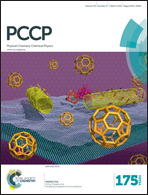Addition of low concentrations of an ionic liquid to a base oil reduces friction over multiple length scales: a combined nano- and macrotribology investigation†
Abstract
The efficacy of ionic liquids (ILs) as lubricant additives to a model base oil has been probed at the nanoscale and macroscale as a function of IL concentration using the same materials. Silica surfaces lubricated with mixtures of the IL trihexyl(tetradecyl)phosphonium bis(2,4,4-trimethylpentyl)phosphinate and hexadecane are probed using atomic force microscopy (AFM) (nanoscale) and ball-on-disc tribometer (macroscale). At both length scales the pure IL is a much more effective lubricant than hexadecane. At the nanoscale, 2.0 mol% IL (and above) in hexadecane lubricates the silica as well as the pure IL due to the formation of a robust IL boundary layer that separates the sliding surfaces. At the macroscale the lubrication is highly load dependent; at low loads all the mixtures lubricate as effectively as the pure IL, whereas at higher loads rather high concentrations are required to provide IL like lubrication. Wear is also pronounced at high loads, for all cases except the pure IL, and a tribofilm is formed. Together, the nano- and macroscales results reveal that the IL is an effective lubricant additive – it reduces friction – in both the boundary regime at the nanoscale and mixed regime at the macroscale.


 Please wait while we load your content...
Please wait while we load your content...